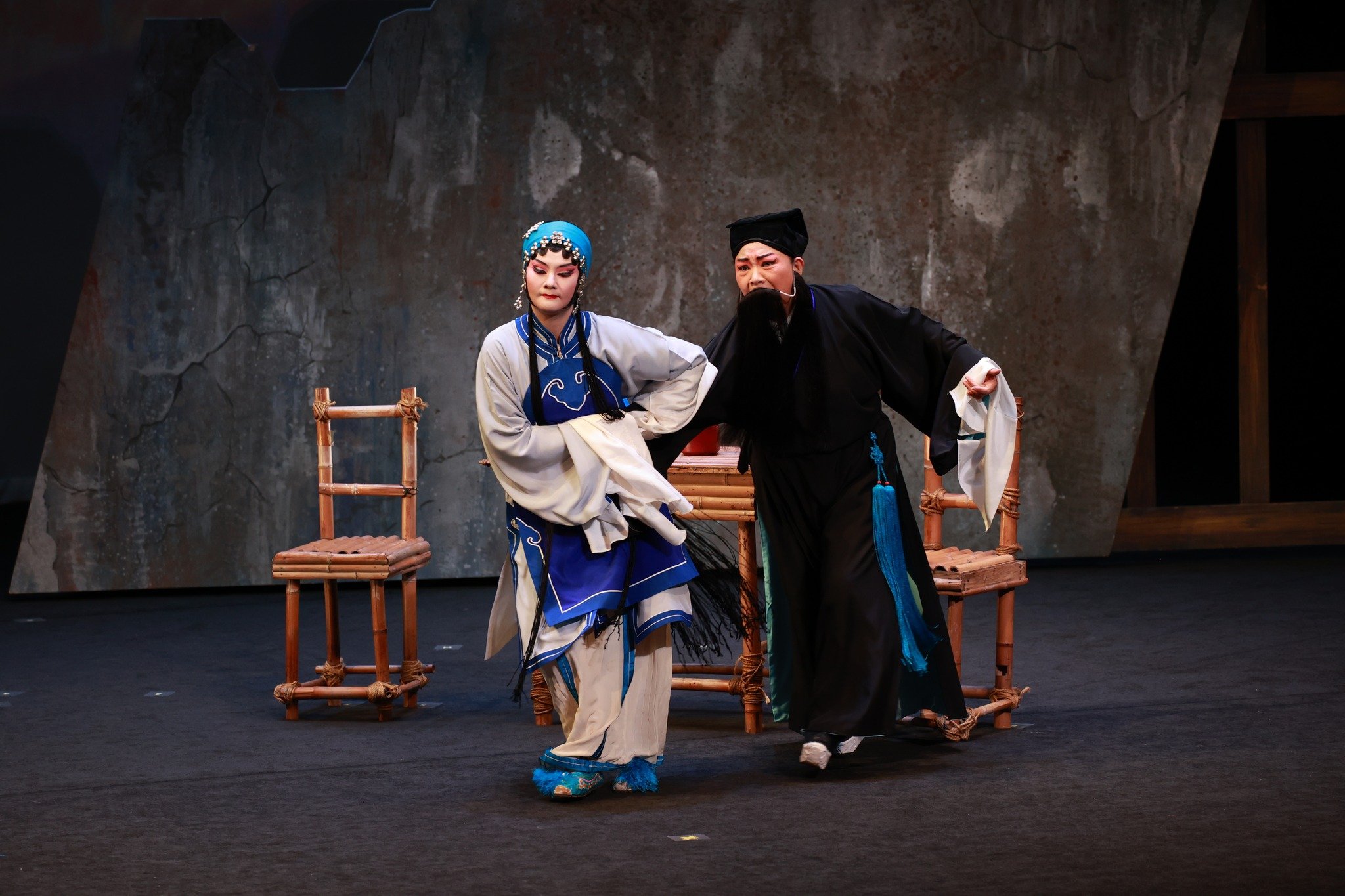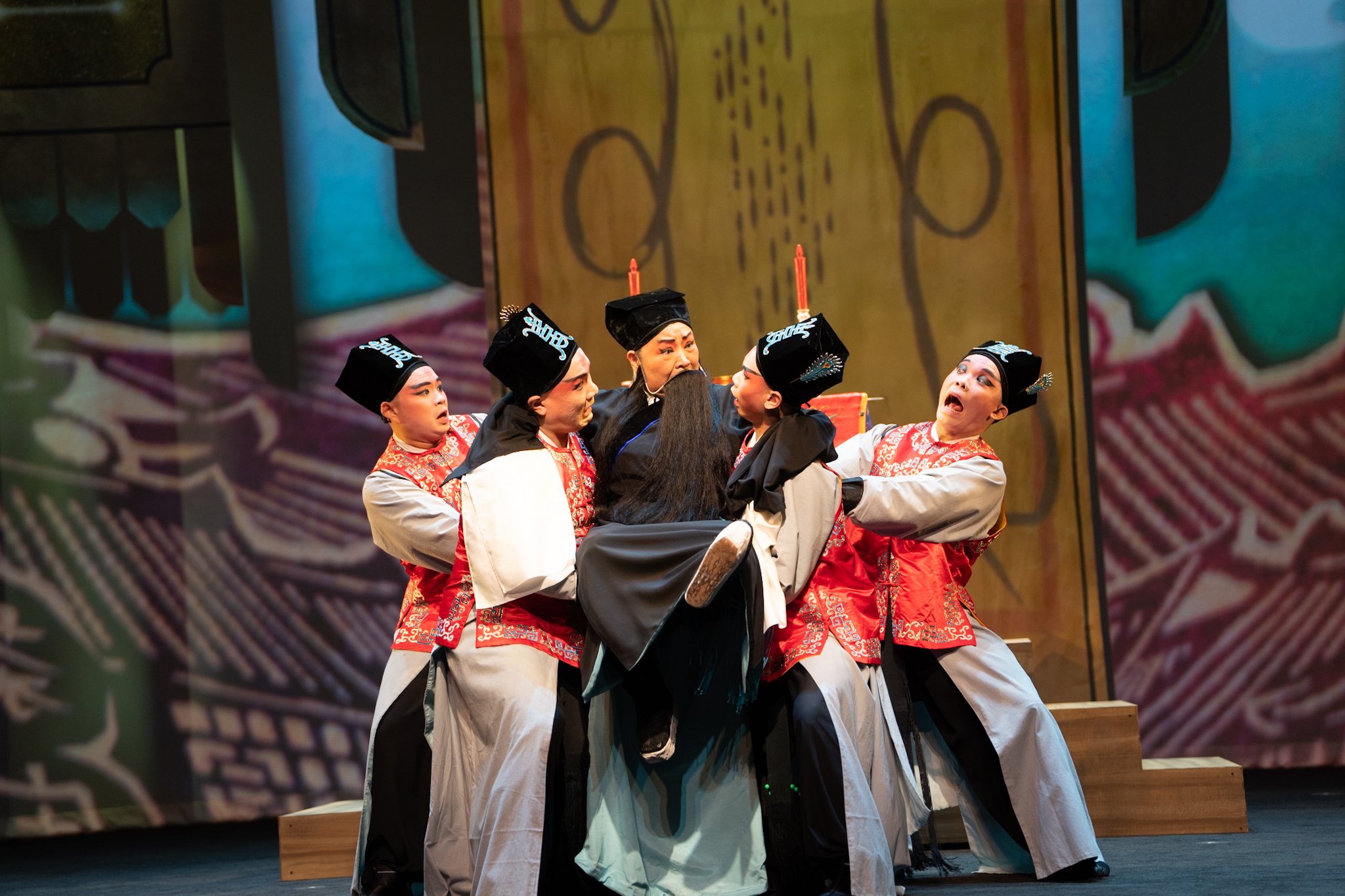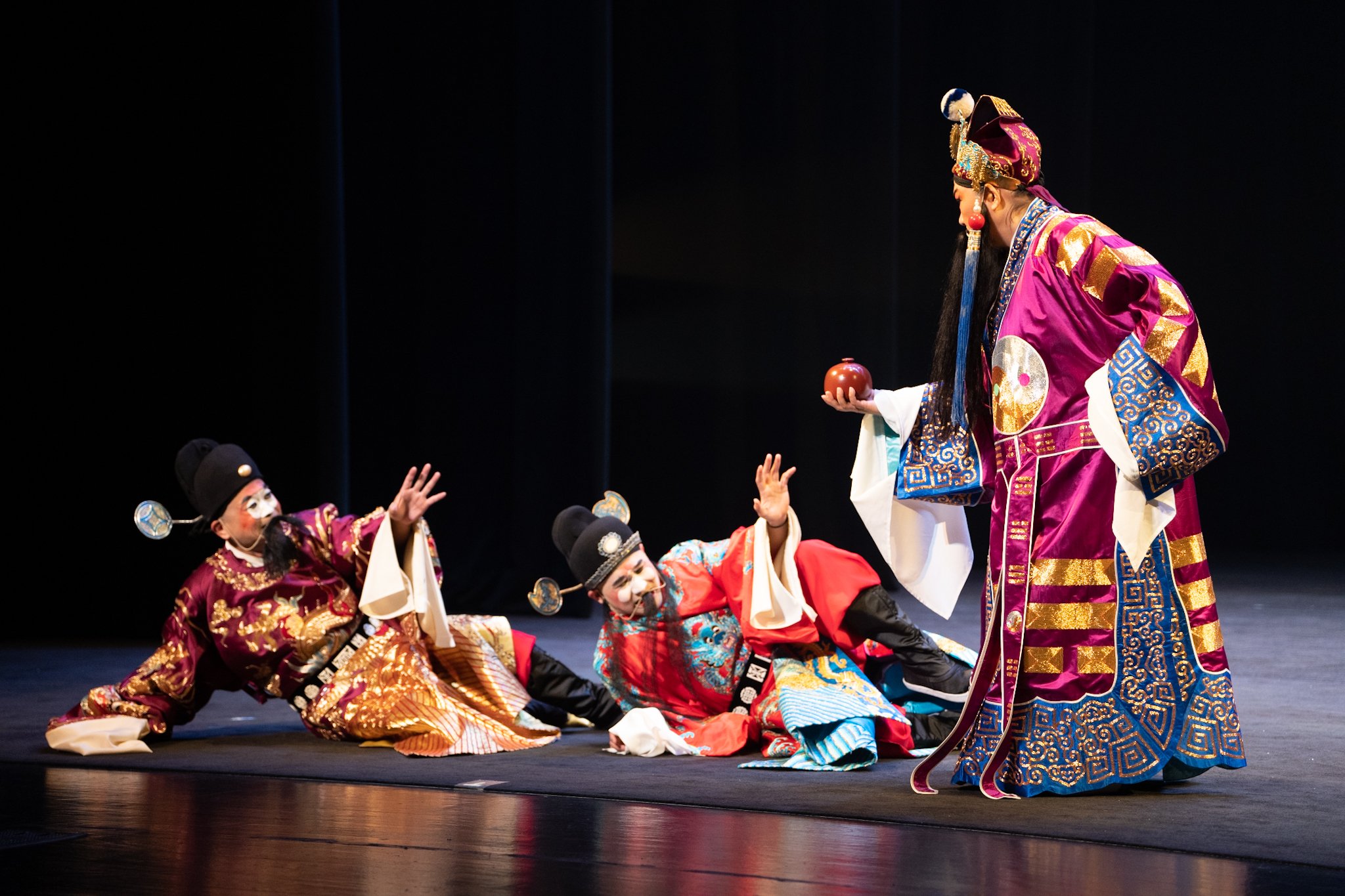The Best Cure for a Pandemic Hangover: Bangzi Opera's Side-Splitting Comedy
In Please Lie To Me, Jin Deng-Ke (left) pretends to be a clairvoyant and helps his fellow villagers retrieve the missing bull. Image courtesy of Taiwan Bangzi Opera Company
NEW TAIPEI, Taiwan — Have you ever found yourself in a situation where you unintentionally lied once, but had to make up for that lie with another lie, and yet another lie?
Since we were little, we have been taught about the consequences of deception through stories like "The Boy Who Cried Wolf," in which the boy's mischievous lie resulted in him being devoured by a wolf. We are encouraged to be honest and to treat others with integrity, with the hope of making the world a better place. But can you imagine living in a world where people beg you to lie?
On the occasion of its 70th anniversary, Taiwan Bangzi Opera Company (臺灣豫劇團) debuted an opera production titled Please Lie To Me (求你騙騙我) at the New Taipei Performing Arts Centre.
The story follows Jin Deng-Ke (金登柯), an impoverished scholar who, in the middle of the night, ran into by a "bull" and mistook its horns and tail for the limbs of a ghost. Upon recounting his experience to his wife at home, Jin's wife realised that the "ghost" her husband encountered may actually be the villagers’ missing bull. The wife convinced Jin to pretend to be a "clairvoyant" who, with the ability to foresee future events, helped the villagers retrieve the missing bull.
At first, Jin was reluctant to comply as he believed that such an act would compromise his integrity and moral principles. But he eventually gave in to his wife's plan in order to compensate for the rice and meat he lost to the bull on his way home. Jin informed the villagers that he could “see” the whereabouts of the missing bull, and after the bull was found, the villagers were convinced of Jin’s supernatural abilities.
Jin Deng-Ke’s wife (left) persuades him to act as a "clairvoyant" who has the ability to foresee future events. Image courtesy of Taiwan Bangzi Opera Company
Jin Deng-Ke is surrounded by subordinates of the visiting senior office who ordered Jin to bring down the rain. Image courtesy of Taiwan Bangzi Opera Company
Word of Jin's supposed supernatural abilities quickly spread. Local official came to Jin and asked him to pray — after months of drought — for the rain, something that Jin was obviously not capable of doing. However, luck seemed to be on his side. Jin's wife noticed the water droplets in the salt jar and believed that this was a sign that rain was imminent, and it did rain.
As it turned out, the moisture in the air, though imperceptible to humans, caused the salt in the jar to "sweat" in anticipation of the rain. In Chinese culture, the saying "the salt jar releases its brine, and the heavy rain pours down" is a profound wisdom that has been passed down through generations. But the most people attributed the rain to Jin's supernatural power.
The rumor of Jin's extraordinary abilities spread quickly, eventually reaching the ears of the emperor, who summoned Jin to locate a precious jade cup that had gone missing.
To test Jin's abilities, the emperor asked the clairvoyant to guess what he was holding in his hand. Nervous and frightened, Jin replied, "Da qíng zao, mao leng han," which literally translates to “I've been sweating since early this morning.” To the emperor's surprise, Jin's guess was correct. It turned out that "da qing zao" is a homophone for "a big green date," which was precisely what the emperor had in his hand. The date was held tightly in the emperor's hand, causing it to appear as though it was “sweating”.
The emperor asked Jin to recover his lost jade cup. At first, Jin declined the request, candidly admitting that the discovery of the bull and the rainfall that occurred were merely coincidental and not due to any supernatural power. He even went as far as to call himself a liar to avoid the responsibility imposed upon him. Despite Jin's adamant refusal, the emperor was convinced that Jin was only being modest and implored him to help, even if he had to lie. This request eventually turned into an imperial order that Jin could not turn down.
Although Jin was worried, fortune smiled upon him once again. While interrogating the suspects, Jin cleverly employed his salt jar and falsely claimed that the jar could detect lies and evil deeds committed by those who touch it. Out of fear, the culprit made a confession without even laying a finger on the jar.
The play ends on a happy note, as Jin successfully completes his mission and is rewarded with a senior position at court. However, before resuming his duties, Jin requests a brief leave to visit his family back home. Fearing that Jin might not return from his leave, the emperor proposes an exchange of his precious jade cup for Jin's "magical" salt jar, not knowing that the jar is nothing more than an ordinary container.
Jin Deng-Ke attempted to use his “magical” salt jar to identify the perpetrator who stole the emperor’s jade cup. Image courtesy of Taiwan Bangzi Opera Company
Please Lie To Me is an adaptation of the Peking opera repertoire The Story of Beg to Lie (求騙記). The script was purchased from playwright Lin Ge-Ming (林戈明) by Chu Lu-Hao (朱陸豪), who first performed the play in Taiwan more than two decades ago.
Having previously watched a recording of Chu Lu-Hao's performance in 2002, I noticed that some scenes from the Peking opera version were left out in this adaptation. However, this omission did not weaken the overall impact of the story.
It is worth noting that Please Lie To Me is directed by Chu, who streamlined the formalities of traditional opera and incorporated techniques from television and film. This transformed it into a unique stage play in Chinese operatic style.
What makes Please Lie To Me even more special is that it marks the final performance of Chu Hai-Shan (朱海珊), a renowned Bangzi opera actress who is well-known for portraying male roles on stage.
As an avid fan of Chinese opera, I was thrilled to witness a Bangzi opera performance live for the first time. Despite frequently attending Peking opera shows, I found it difficult to detect any noticeable differences between the two styles at first glance. The pronunciation of the dialogue is also quite similar to Mandarin Chinese, making it understandable to most viewers without the need for subtitles.
So what can we take away from this absurd comedy? One thing is certain — it does not advocate lying.
As I have concluded, the moral lesson of the story, if there is one, is that sometimes we ought to tell people what they want to hear, even if it means telling a little white lie. After all, the definition of what constitutes a "lie" isn't always clear-cut, and it can vary depending on the listener. Let us not forget that the emperor in Please Lie To Me didn't mind if Jin lied, as long as he accomplished what he was asked to do.
And if the moral of the story doesn't resonate with you, that’s totally fine - Please Lie To Me is a side-splitting comedy that is sure to leave you in stitches.
The emperor (centre) asked Jin to exchange his magical salt jar with the precious jade cup as a way of ensuring his return. Image courtesy of Taiwan Bangzi Opera Company
Performance: Please Lie To Me
Genre: Chinese Opera
Worth the journey: ★★★☆☆
More on Bangzi opera in Taiwan:
Bangzi opera, also known as Henan opera, has its origins in northern China. Despite wars and upheavals, this operatic tradition made its way southward and eventually took root in Kaohsiung, Taiwan. After World War II, the Zhongzhou Henan Opera Troupe was established. With the support of the Ministry of National Defense, the troupe spent some time in Kaohsiung, before merging with the Taiwan Bangzi Opera Company of the National GuoGuang Opera Company in 1996.
Taiwan Bangzi Opera Company premiered Please Lie To Me on February 17-18, 2023 in New Taipei Performing Arts Centre, New Taipei City.





